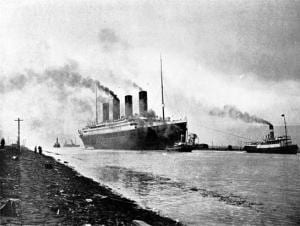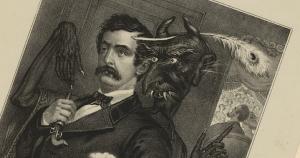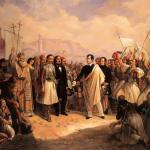
 Every year Americans face two anniversaries on one day: the sinking of the White Star Liner Titanic and the assassination of President Abraham Lincoln. This year, for assorted reasons, I have been trying to understand John Wilkes Booth. He was no madman, thought himself a great man, and might have been if he had not become a monstrous man.
Every year Americans face two anniversaries on one day: the sinking of the White Star Liner Titanic and the assassination of President Abraham Lincoln. This year, for assorted reasons, I have been trying to understand John Wilkes Booth. He was no madman, thought himself a great man, and might have been if he had not become a monstrous man.
If we merely mock him, then we cannot understand him and so avoid him. Days before April 14/15, Booth had decided, was planning, to change history. He thought he would kill a tyrant, but instead became a tyrant. Booth ended the best hope Reconstruction had and left us with Lincoln’s greatest error: Andrew Johnson. The Titanic might have avoided the iceberg on that April night, but Booth was headed for damnation long before he pulled the trigger.
A ship cannot choose her fate, so we might think she was more doomed than Booth on April 14/15, yet she was full of men and women with free will. They could have right up to the very end have chosen differently. Even when they did not, when the ship was doomed, they could choose how they would die. Many who seemed fated to obscurity, or who had lived badly, died like men and so redeemed much.
Booth by now, the end of March, the start of April, was gone. The historical records say that Judas slipped out to deliver Jesus to His foes, Satan entering him. In his plotting and planning before Good Friday 1865, John Wilkes Booth chose to be demonized. Most of us are not as talented as Booth, one of the best known faces in America. Before his death he was already frittering away his talent, never driven to excellence like his brother who became one of the greatest actors in American history. Women adored him, he used them, never finding love. Racism consumed him and he split with his family in supporting the rebellion. He hated free Black people.
Through all his bad choices, his monstrous exploitation of family and friends, he was charming, a good companion in the short-term. Booth needed judgment to save his soul in the longterm, but kept receiving mercy. By mid-April, his course was set. He would kill Mr. Lincoln. When he did the deed, unlike even Judas, Booth was incapable of doubt. We have his notes as he fled the law and he postured as martyr and hero. When justice found him, when he was shot like a dog in a tobacco barn, he kept striving for some Shakespearean last line. He had stained his family name, yet called out to his mother with nearly his dying breath.
Failure to commit made him shiftless. Using people cut him off from genuine love. Refusing to go to war, while playing at war on stage, left him hollowed out. Hating his neighbor left him a brute who postured as Brutus.
Avoid Booth. Avoid the glib man who will not commit. Avoid the man whose hatreds are more plain than his loves. May we find homely leaders, a Lincoln, and not a flashy man.
Sin makes ruin inevitable. Booth’s last words, as he struggled to move, summed up what his free will, his power to act, became long before mid-April:
“Useless. Useless.”












